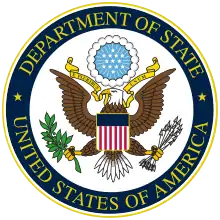Fraser Wilkins
Fraser Wilkins (August 30, 1908 – January 21, 1989) was appointed the first United States ambassador to Cyprus after the country gained independence from the UK.[1]
Fraser Wilkins | |
|---|---|
| Inspector General of the Department of State | |
| In office July 23, 1964 – August 8, 1971 | |
| President | Lyndon B. Johnson Richard Nixon |
| Preceded by | Norris Haselton |
| Succeeded by | Thomas McElhiney |
| United States Ambassador to Cyprus | |
| In office September 19, 1960 – April 6, 1964 | |
| President | Dwight D. Eisenhower John F. Kennedy Lyndon B. Johnson |
| Preceded by | Position established |
| Succeeded by | Taylor G. Belcher |
| Personal details | |
| Born | August 30, 1908 Omaha, Nebraska, U.S. |
| Died | January 21, 1989 (aged 80) Washington, D.C., U.S. |
| Spouse(s) | Anne Bryan |
| Children | 1 |
| Education | Yale University (BA) |
Personal life
Fraser Wilkins was born in Omaha, Nebraska to Harry F. Wilkins and his wife.[2][3] He graduated from Yale University. He married Anne Bryan, and they had one son, Fraser Bryan Wilkins.[1][3]
Career
Wilkins served in various positions as a US Foreign Service Officer.[4] He was director of the Bureau of Near Eastern Affairs in the Department of State from 1955–1957, and during these years, he was stationed in Iraq, Morocco, India, and Iran. He then served as a minister-counselor in the US embassy in Tehran, Iran from 1957–1960.[1][5][6]
Wilkins was appointed the first ambassador to Cyprus in 1960.[1] He served in this position until 1964. During his time as the US ambassador to Cyprus, there were tensions in the country between the Greek and Turkish Cypriots.[1] The US embassy in Nicosia was bombed in February 1964.[7] Following the two-bomb explosions, Wilkins went to the Presidential Palace to protest what happened, and he also oversaw the evacuation of American civilians from the country. He told the President of Cyprus, Archbishop Makarios III, that he was not confident Cypriot police could adequately protect the American civilians.[7]
After he resigned as the US ambassador to Cyprus in 1964, the White House announced that Wilkins would be returning to Washington, D.C. to await appointment to another position.[8] That same year, Wilkins was named inspector–general of the United States Foreign Service, and he served in this position until 1971.[1][4]
Death
Wilkins died of a stroke in Sibley Memorial Hospital in Washington, D.C. on January 21, 1989, at the age of 80.[1]
References
- "Fraser Wilkins Is Dead; Ex-U.S. Envoy Was 80". The New York Times. 1989-01-24. Archived from the original on 2019-06-07. Retrieved 2019-06-07.
- "The Political Graveyard: Index to Politicians: Wilkins". politicalgraveyard.com. Archived from the original on 2019-06-07. Retrieved 2019-06-07.
- "Miss Grayson, Mr. Wilkins Engaged". Washington Post. 1980-10-08. Archived from the original on 2019-06-07. Retrieved 2019-06-07.
- "Fraser Wilkins (1908-1989)". Office of the Historian, Bureau of Public Affairs. Archived from the original on 2019-06-07. Retrieved 2019-06-07.
- McKinzie, Richard D. (1975-06-20). "Oral History Interview with Fraser Wilkins". www.trumanlibrary.org. Archived from the original on 2019-06-07. Retrieved 2019-06-07.
- Milani, Abbas (2008). Eminent Persians : The Men and Women Who Made Modern Iran, 1941-1979 (1st ed.). Syracuse, N.Y.: Syracuse University Press. p. 447. ISBN 9780815609070. OCLC 225870858.
- "2 Bombs on Cyprus Rock U.S. Embassy". The New York Times. 1964-02-05. ISSN 0362-4331. Archived from the original on 2019-06-07. Retrieved 2019-06-07.
- "U.S. Announces Resignation Of Ambassador to Cyprus". The New York Times. 1964-03-26. Archived from the original on 2019-06-07. Retrieved 2019-06-07.
| Diplomatic posts | ||
|---|---|---|
| New office | United States Ambassador to Cyprus 1960–1964 |
Succeeded by Taylor G. Belcher |
